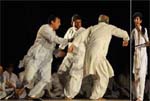 Presentation of a collage of prominent productions of the noted theatre troupe Dhaka Theatre made Monday evening an ecstatic one for theatre lovers.
Presentation of a collage of prominent productions of the noted theatre troupe Dhaka Theatre made Monday evening an ecstatic one for theatre lovers.
Dhaka Theatre celebrated its 40th founding anniversary through the presentation at the National Theatre Hall of Bangladesh Shilpakala Academy.
Dhaka Theatre was founded on July 29 in 1973 by a group of theatre activists who were ablaze with the vision and spirit of the war of independence.
It was a great opportunity for the audience to see seasoned actors like Raisul Islam Asad, Afzal Hossain, Shimul Yusuff, Shahiduzzaman Selim, Shomi Kaiser, Rosy Siddiqui and others together on stage.
The presentation of certain segments from different productions on the evening was compiled in a way to so that the audience has an opportunity to understand the experimental and rewarding journey Dhaka Theatre has undergone over the past 40 years.
All the members of the troupe sat in a circle on stage, and Raisul Islam Asad, Afzal Hossain and Shomi Kaiser introduced the audience to different productions and their theatrical nature.
The presentation began with Dhaka Theatre’s first production Sangbad Cartoon staged in 1973. This play by Selim Al Deen followed German playwright Erwin Piscator’s documentary theatre. The play amusingly documents the current happenings and news items in a society.
The next presentation was Jaundice O Bibidha Balloon, premiered in 1974, which followed the western absurd theatre.
A segment of musical comedy Muntasir, premiered in 1976, was also staged on the occasion. The combination of music and humorous dialogues of the scene got the audience break into laughter and cheers.
The troupe then presented plays of the eighties like Sakuntala, Kittonkhola, Keramatmongol and Haat Hodai. These plays collectively reflect a search for the root of our culture. Western influences vanish from these productions and a new theatre form is achieved. Local dialects, characters and culture become the dominant points of focus in these plays. In addition, presentation of the plays was in a narrative form.
Experimentation with this narrative form led Dhaka Theatre to the concept of katha natya. Popular production Chaka is a specimen of this form. The audience was wrapped in pleasure to watch riveting performances by Raisul Islam Asad and Shimul Yusuff. Another presentation of this form was Jaibati Konyar Mon.
Kotha natya form eventually led the troupe to a new form termed Nabyapachali. This has noticeable connection with the age-old form of pala presentation. To emphasise this particular form, the troupe presented segments of the plays like Bono Pangshul and Prachya. The last presentation for the evening was an adaptation of Shakespeare’s The Tempest in the nabya pachali form.
A full-house audience, in spite of the Ramadan, attended the celebration and enjoyed the collage.
Dhaka Theatre also remembered and showcased photographs of the troupe’s seven deceased members.
A number of theatre troupes, along with Bangladesh Shilpakala Academy, greeted Dhaka Theatre with bouquet of flowers. Writer-playwright Syed Shamsul Haque delivered words of blessing on the occasion.
‘This is a rare chance to see so many noted theatre personas and productions together’, said a delighted Rakibul Hasan who teaches at a private university.
‘I am happy to be here this evening. It’s a real treat by Dhaka Theatre’, said Zahid Mamun, a Dhaka university student.
-With New Age input




















